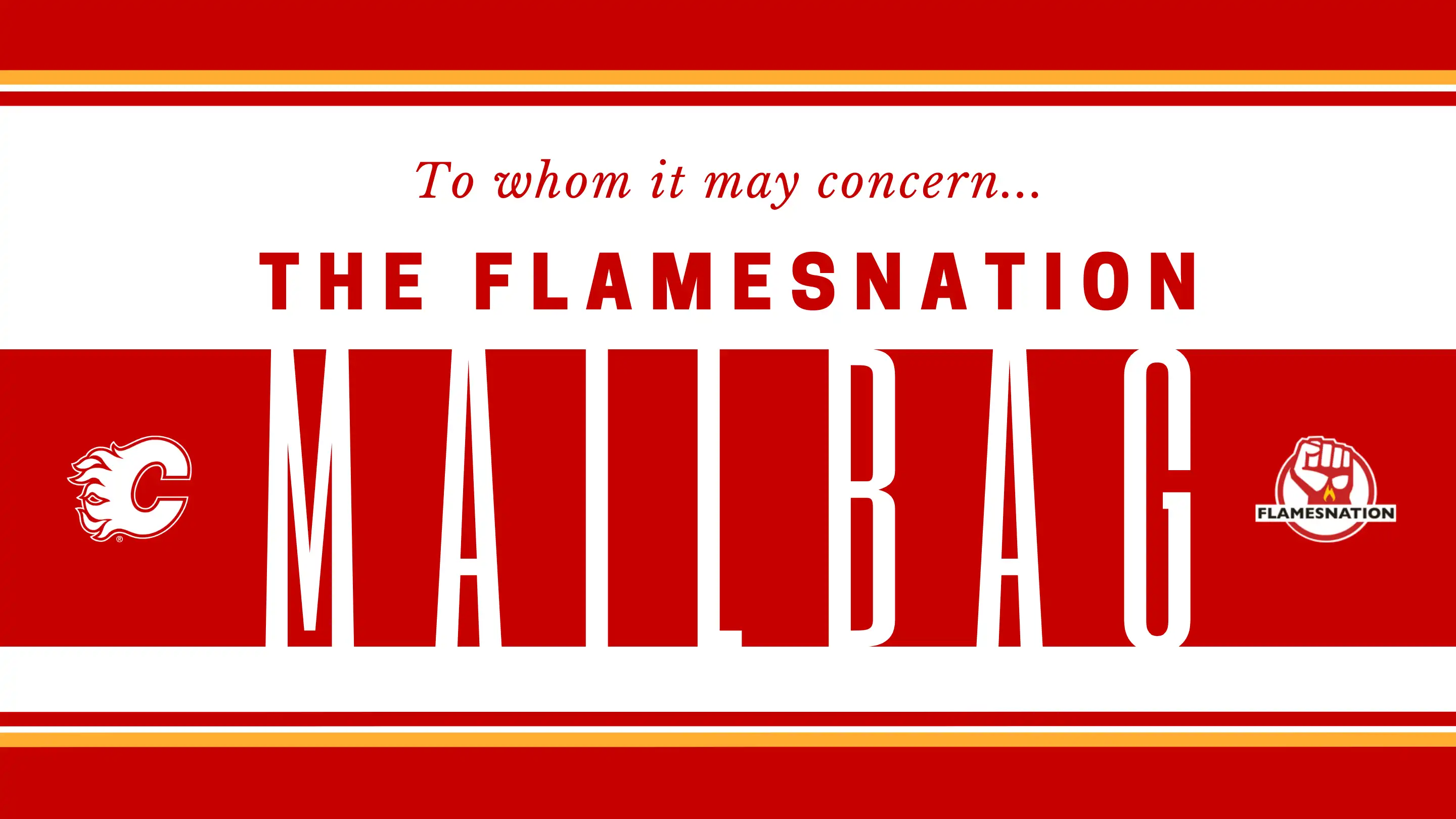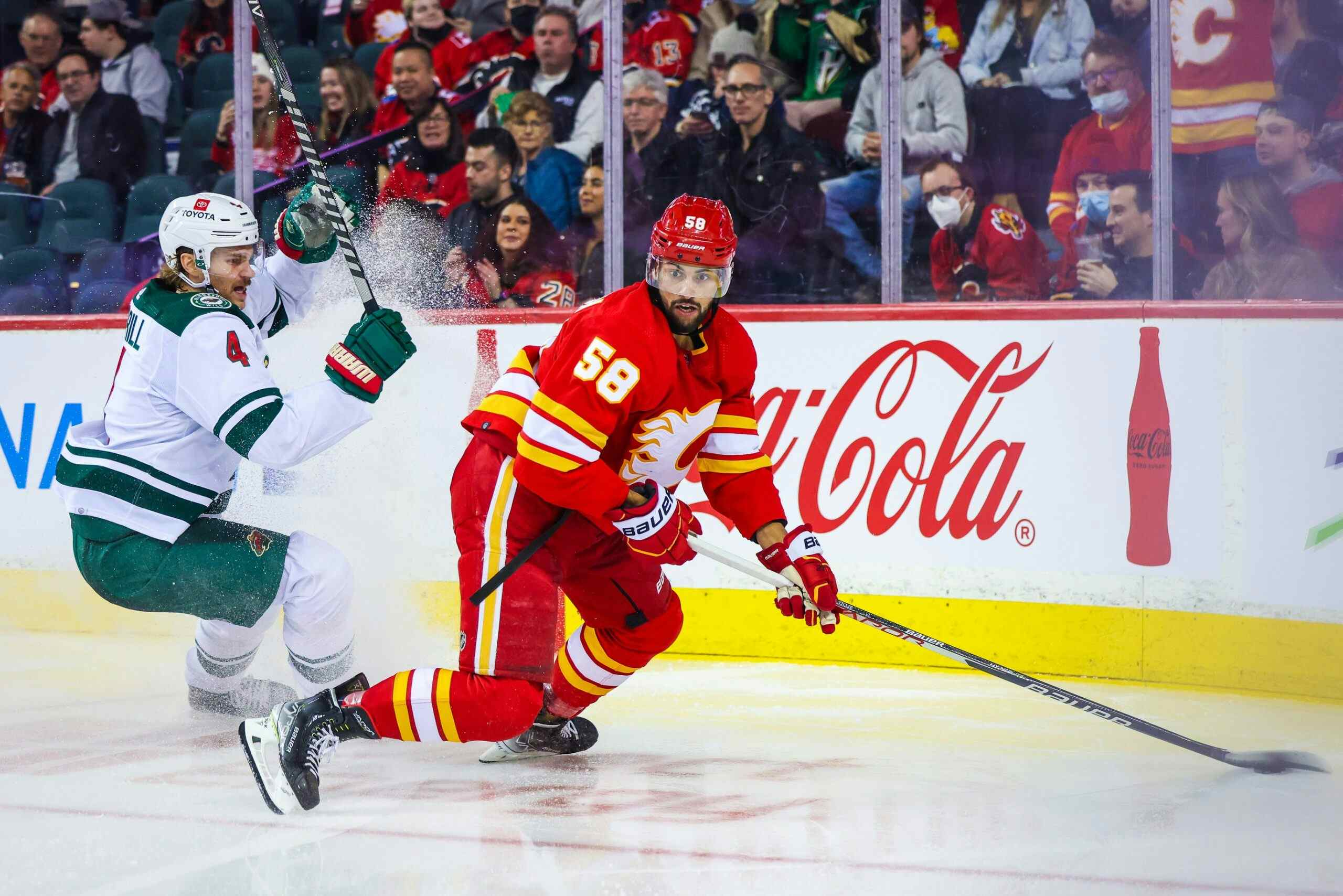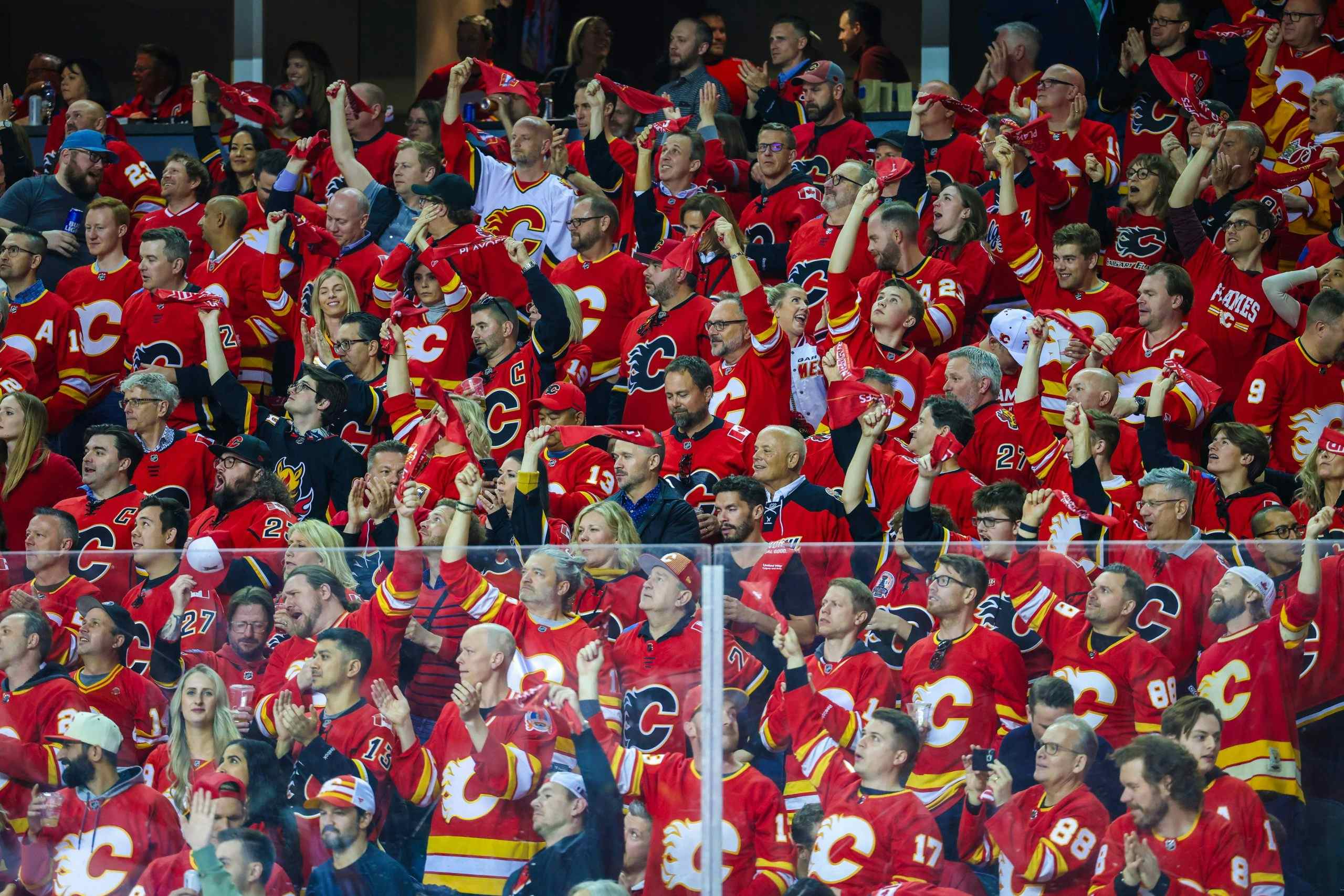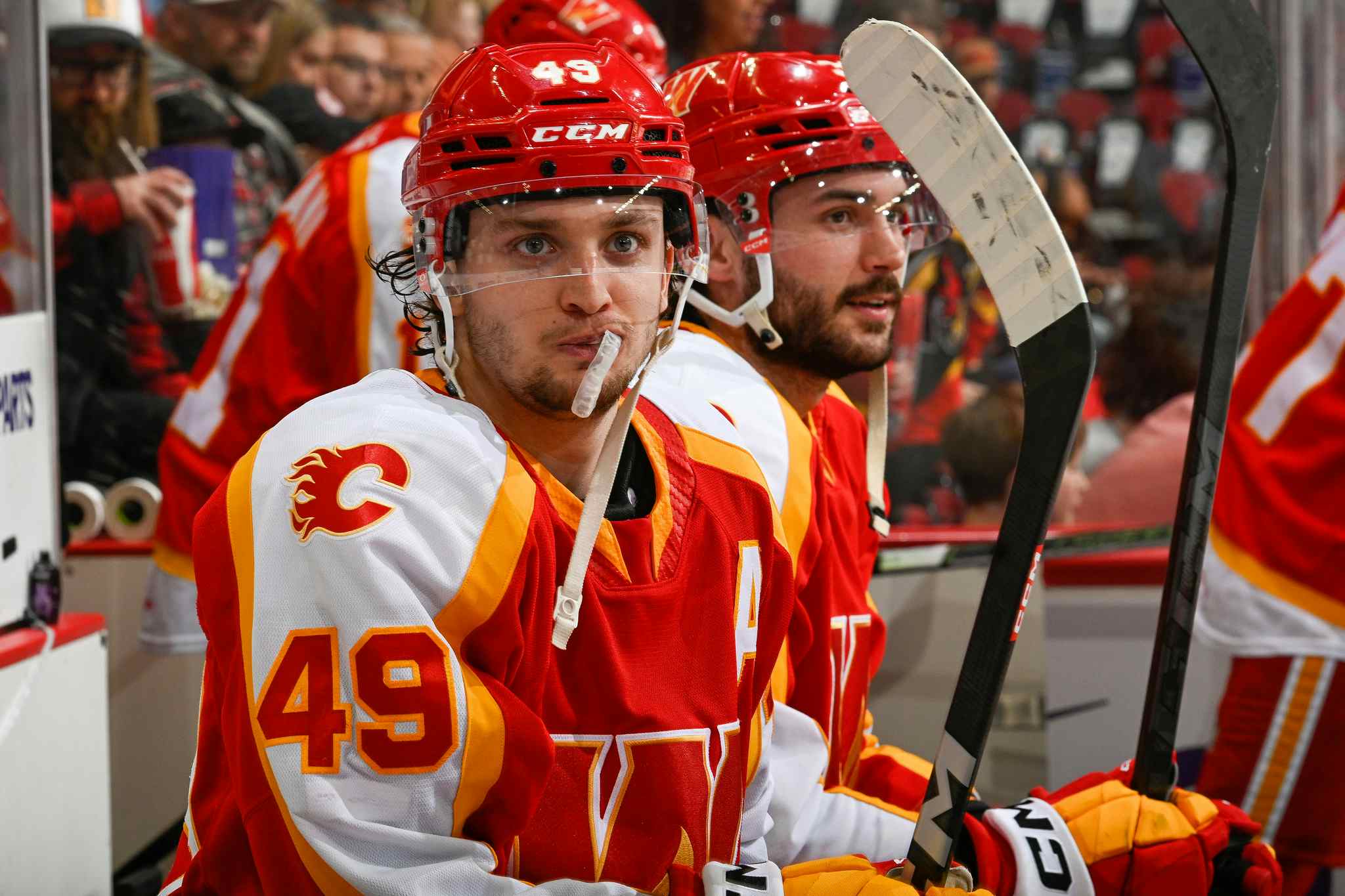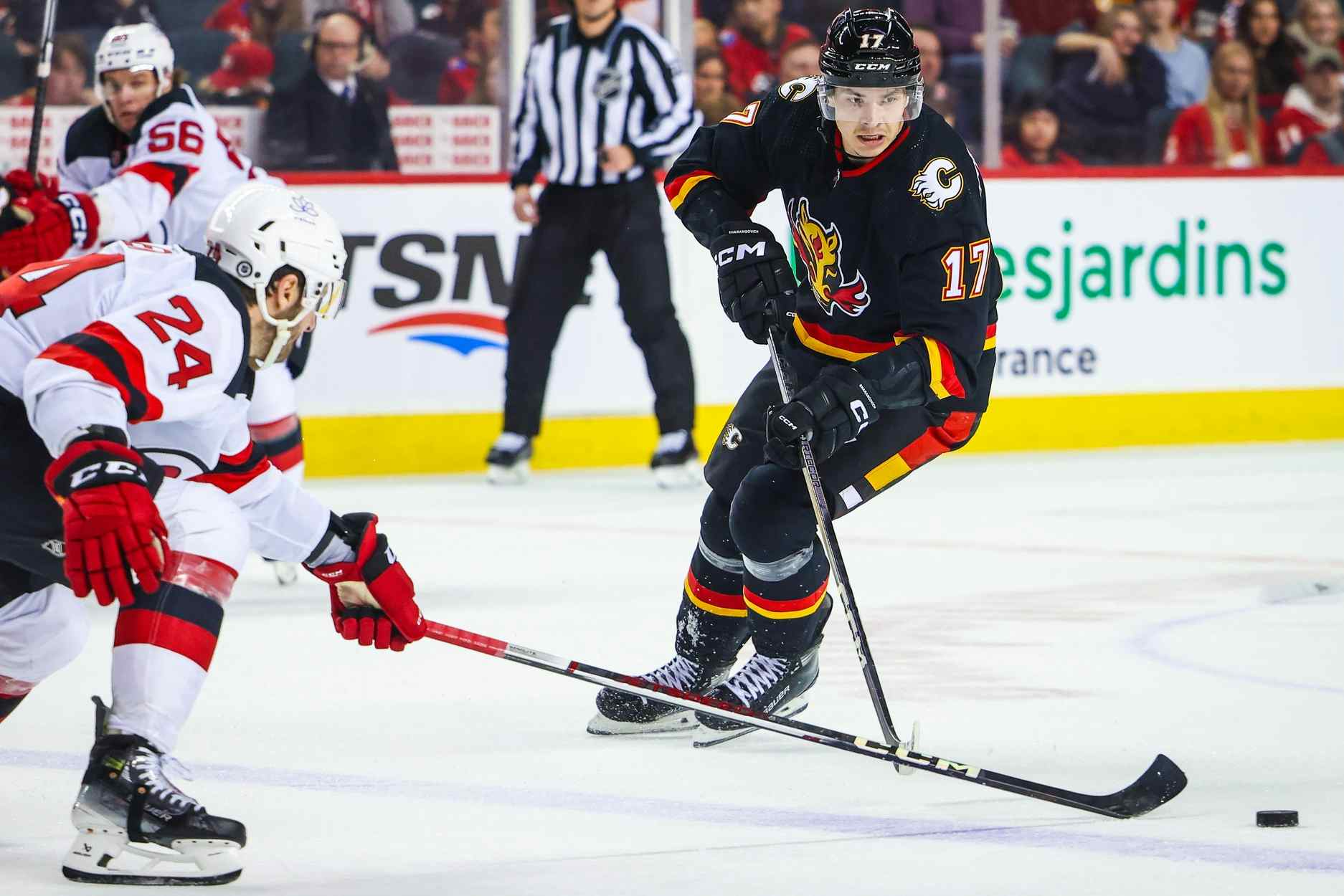Ducks 3, Flames 2 post-game embers: From the jaws of overtime
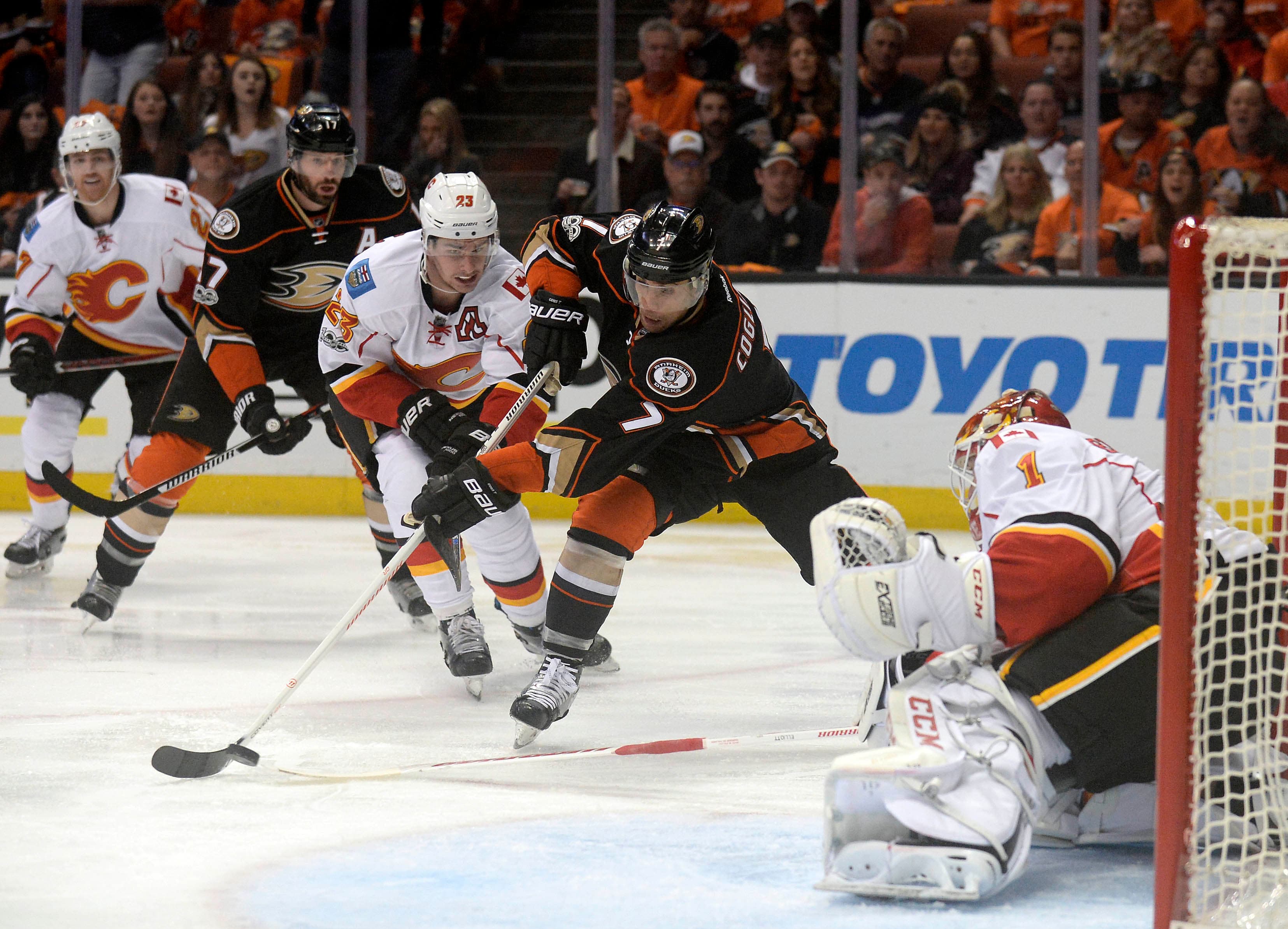
By Ari Yanover
7 years agoBrian Elliott and his Flames rebounded from a horrific first to take the lead – only not really – and look to be on the verge of at least playing to overtime when a late powerplay goal, courtesy of yet another Dougie Hamilton penalty, ended all hopes of coming back home with at least one win.
And look, I get it, it’s frustrating. You can blame the officials all you want – for yet another disallowed Flames playoff goal, for penalties called and those not, what have you – but fact of the matter is, the Flames put themselves in this position. They did it by giving up bad goals early in the game. They did it by not scoring on the several quality chances they had throughout the night. They did it by not capitalizing on John Gibson’s rebounds. They did it by failing to score on back-to-back powerplays: the very thing that sunk them in Game 1. And they did it by putting themselves in situations that the officials saw fit to penalize, justified or not.
For the second straight game, they played well. For the second straight game, they did themselves in. And you know what?
It doesn’t matter
This isn’t exactly the most pleasant approach to take, but it’s the realistic one. And no, I’m not going off on some “it’s only game, why you heff to be mad” tangent – it’s that, in this team’s big picture, this playoff series does not matter. The mission for this season has already been accomplished; everything else now is just bonus (with some reaffirmation and teachable moments mixed in).
The Flames are not going to win the Stanley Cup this year. I want them to rattle off 16 wins too, but it’s probably not going to happen. They’re not a team built for that at this point in time. And that is perfectly okay.
This is a team that dawdled on rebuilding, convinced by an isolated two months of success – the spring of 2004 – that all it needed was to get in, and anything could happen. That’s true to some extent, but when that’s the basis for your entire franchise, you’re doomed. And the Flames were happy to proceed along, doomed for at least half a decade, before they decided to do anything about it.
This is the last year of waiting. At least in theory it is; if this continues next year it might be a good time to get a little more disgruntled. But I’ve said it before – I think I’ve been saying it all season, really – this year is about growth. This year is not about winning. This year is about proving you are better than you were before. Winning is a side effect of that, but it’s not the only indication.
The Flames are currently not winning, mostly thanks to stupid, isolated mistakes that keep coming back to nip them. It’s frustrating, but it’s fine: because they lost 3-2 for the second game in a row, but for the second game in a row, they were in it right up until the dying seconds, and that is significantly more that you can say about the Flames than it was several years ago.
Young forwards showed up
Remember how Johnny Gaudreau is too small to play in the postseason? Remember how he’s small and weak and will never amount to anything in a meaningful game? It’s kind of like how he was greedy and worthless during contract negotiations, right?
Gaudreau led all Flames forwards in ice time with 19:25, and he earned every second of it. He had a beautiful assist to tie the game, and was buzzing so often he could have picked up another point or two here or there throughout the night. Should he have shot the puck with the clock ticking down and a last-minute giveaway right in front of the net? Probably, and he almost had the game-tying goal in Game 1, too. But he’s one of the last players anyone could blame for the Flames being in the position they’re in right now; he’s one of the first you point to for why they even have a chance to begin with (more on that shortly). Things aren’t perfect, but he’s one of the forwards giving his team a chance.
Sean Monahan now has two goals in two games. Both have been powerplay goals, but both were outstanding. Sam Bennett didn’t score in this one, but he was buzzing all night, and was a part of an effort that could have counted. For all of the angst over Bennett’s development this season, he looks like he’s doing just fine in the playoffs.
They aren’t young, but Mikael Backlund scored his second career playoff goal, and it was yet another beauty. The 3M line had a much-improved night. And Kris Versteeg once again showed up in a big way – both on the powerplay and at even strength – and was dangerous throughout the entire game.
There was a fair bit to like.
Play your best players
Gaudreau is one of the Flames’ best players. He received minutes. He did a lot with them.
That’s a pattern you can generally find when going through everyone’s ice times. Gaudreau, Monahan, Backlund, and Michael Frolik were all heavy hitters.
This is where things go sour.
Versteeg, who was one of the Flames’ best players on the night? 12:42 played. Bennett, who was buzzing alongside him? 11:08. Micheal Ferland, who is supposedly a top nine forward, seeing as how he actually plays alongside Gaudreau and Monahan? 11:19.
Those are fourth liner minutes. Matt Stajan played 11:23, while Lance Bouma played 10:53. In no justified world are they playing roughly as much as Versteeg and Bennett and Ferland. That’s just, well, to take a word from Brad Treliving, asinine player management.
And you knew this was coming: Troy Brouwer played 16:02.
Special teams obviously had their role in that, to which you say: well, why? How is it that Brouwer ended up with twice the shifts of Versteeg in the final 10 minutes of the game? What was he doing out there, last gasp or not? Why is he killing penalties? Why is he on the powerplay? What is it, exactly, that he is doing? For all the inane criticism Gaudreau has received, even he’s shown more physical spite towards the Ducks than Brouwer has. He’s been more willing to start mixing things up, even if just for a brief moment after the game.
I simply cannot wrap my head around the fact that Brouwer is playing on the fourth line – a line that, through common convention, we can assume to be made up of the Flames’ weaker players – and yet is still being treated as though he’s an offensive leader on this team. He’s not. He literally never has been. What are we doing here.
Glen Gulutzan has three lines he can roll that all have strong offensive opportunities (and members from all three have scored now, too). Play them. They’re the team’s best chance at winning. To refuse to do so is to shoot yourself in the foot.
Alex Chiasson and Bennett should be the Flames’ second go-to penalty killing forward unit. It shouldn’t even be a question.
And the defence…
The disparity here is more pronounced than it is for the forwards, thankfully; Matt Bartkowski played just 12:13 over 17 shifts, though it was still alarming to see just how often the play went against him. It was almost as though he’s a defenceman who was plucked out of the AHL to fulfil expansion draft purposes? Despite playing the least he had the most blocked shots which, I think we established during the Kris Russell shenanigans, is not always a good thing.
Not that there’s much to be done about it now, not with the Stockton Heat entering the playoffs – but considering Treliving’s earlier comments and the glut of defencemen that seem to be forming in Stockton, gosh, you really hope a prospect or two is given a genuine shot next season, rather than messing around with the Grossmanns and Bartkowskis of the waiver wire.
The Flames’ big three were the only ones to top 20 minutes, as they should be. This ties in with the whole “next year” thing: next year, hopefully, they have a suitable top four. They don’t right now.
(And yes – fewer poorly timed penalties would help, but there truly aren’t any better options.)
Another game well-played
Co-worker joins me for the end of the first period. The Flames are down 2-0 already; Matthew Tkachuk has taken a double minor. The Flames look like they’re about to be sunk.
Backlund scores shorthanded.
“Wow,” co-worker later says, “that goal completely turned things around.”
For all the mess they got in, for as deep a hole they had to dig themselves out of, the Flames made it a competitive game. They took a game that looked like they were about to get embarrassed – one like two years ago – and made it competitive. They didn’t sit around and feel sorry for themselves like they probably would have if this were January. They took it to the Ducks after, outshooting them 37-29 and falling just short in 5v5 corsi at 48.57%.
They’re not winning, but this isn’t a team that’s going to lie down and die, either. And as alluded to way up above: at this stage of exiting the rebuild, moral victories still mean something.
Three other teams are down 2-0 in their respective series: Chicago, Minnesota, and Columbus. Chicago has a goal differential of -6. Minnesota has a goal differential of -2. Columbus has a goal differential of -5. Those first two teams have squandered home ice advantage. The Flames have a -2 goal differential on the road. The games have been close, both could have gone either way, and they’re losing by the slimmest of margins… and almost all of their best players are young.
It could be much, much worse. Instead, it’s competitive. And that frustration will ALWAYS be better than apathy.
Recent articles from Ari Yanover

